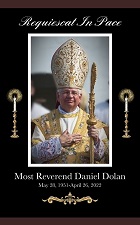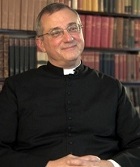Non-Pope Does Not Get Supplied Power
I recently found some tweets by Fr. Nicholas Desposito and Father Damien Dutertre, and I would like to comment on these tweets. Both of them are adherents of “The Thesis of Cassiciacum” and members of the “Roman Catholic Institute” which recognizes Novus Ordo non-popes as “material popes” who have limited jurisdiction: to nominate others to receive authority, (e.g., bishops) and electors (cardinals) of the pope, and validly change the rules of election. Father Desposito is the Vice Rector of Most Holy Trinity Seminary and currently teaches Dogmatic and Moral Theology.
First tweet:
@FrDesposito
In answer @LukeDashjr
The ONLY reason why Francis gets supplied power for naming Cardinals is because the good of the Church requires it (the Papacy can't be restored w/out Papal electors). It's up to you if u think that it is good of the Church to excommunicate those who try to get rid of a heretic.
4:17 AM - 11 Feb 2022
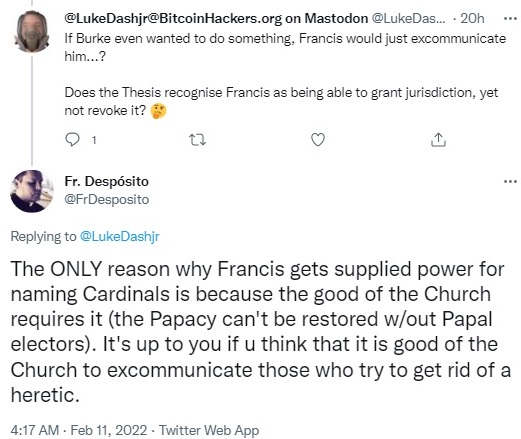
My comment:
It’s clear that Father Desposito recognizes Non-Pope Bergoglio as a Pope and the Novus Ordo as the Catholic Church.
The Catholic Church teaches that only a validly elected Pope has the power of creating Cardinals, and this power is not supplied. A validly elected Pope obtains this power as soon as he has given his consent to his election. “Francis” was never elected.
According to Canon 232, §1 and Canon 233, §1, the Roman Pontiff has the sole power to create Cardinals. The mode of creating Cardinals is reserved exclusively to the Roman Pontiff.
CAN. 232, §1. Cardinales libere a Romano Pontifice ex toto terrarum orbe eliguntur, viri, saltern in ordine presbyteratus constituti, doctrina, pietate ac rerum agendarum prudentia egregie praestantes.
CAN. 233, §1. Cardinales creantur et publicantur a Romano Pontifice in Consistorio sicque creati et publicati obtinent ius ad electionem Romani Pontificis et privilegia de quibus in can. 239.
THE REV. P. CHAS. AUGUSTINE comments as follows:
"The mode of creating Cardinals is left to the Roman Pontiff. However, as a rule, the Pope creates them and publishes their names in a secret consistory, 19 at which only the Cardinals already created are de iure present, and from this moment the new cardinals begin to enjoy cardinalitial rights and privileges. In a subsequent public consistory, to which, among others, the diplomatic corps, dignitaries, clergy and laity are admitted, they receive the red hat and take the oath of fidelity to the Pope. 19 Pius V, Jan. 26, 1571; Gregory XV, "Decet," March 12, 1622, modified the Constitution of Eugene IV, "In eminenti," Oct. 26, 1431.”
(A COMMENTARY ON THE NEW CODE OF CANON LAW, By THE REV. P. CHAS. AUGUSTINE, O.S.B., D.D. Professor of Canon Law, VOLUME II, Clergy and Hierarchy (Can. 160, 188.4, 221) B. HERDER BOOK CO. 17 SOUTH BROADWAY, ST. Louis, Mo. AND 68 GREAT RUSSELL ST. LONDON, W. C. 1918, CUM PERMISSU SUPERIORUM, NIHIL OBSTAT, Sti. Ludovici, die Sept. 7, 1918, F. G. Holweck, Censor Librorum., IMPRIMATUR, Sti. Ludovici, die Sept. 8, 1918., +Joannes J. Glennon,, Archiepiscopus, Sti. Ludovici., Printed in U. S. A., pp. 233-234)
Therefore, since the person mentioned by Fr. Desposito, is not a Pope, he cannot get “supplied power for naming Cardinals”. He is not even a priest, since he was installed according to the invalid rite of “Paul VI”. The only “supplement” this public heretic has already got, is ipso facto excommunication.
Even if one day he converts to the Catholic Faith, repudiates Vatican II and its evil reforms, he does not obtain any power, and his conversion does not automatically turn him into a Pope, because he was never a Pope. Also, his conversion does not turn non-Cardinals into Cardinals. Being a public un-repented heretic, he is ipso facto excommunicated from the Catholic Church, and no declaratory or condemnatory sentence is needed. The fact that he illegally occupies the Vatican Palace and wears some Papal garments, does not make him a “material pope” and he does not get any “supplied power” either.
Therefore, it is absolutely clear that the statement that a non-pope “gets supplied power for naming Cardinals” is completely false.
However, it should be said in fairness that it is indeed true that “the Papacy can't be restored w/out Papal electors”.
The only question left without a clear answer yet is this: Who could be these electors during the current Sede Vacante?
Second tweet:
@FrDespositoReplying to @FrDesposito and @RealNazianzen
Both schools reject the #mobtheory though. Even the ipso facto depositus school says that the Church must legally remove the heretical Pope. This is not a legalistic/bureaucratic requirement, but it is ontologically demanded by the juridical constitution of the Church. #fact
3:52 PM - Feb 14, 2022
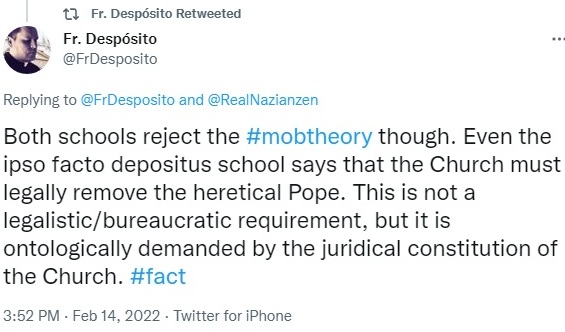
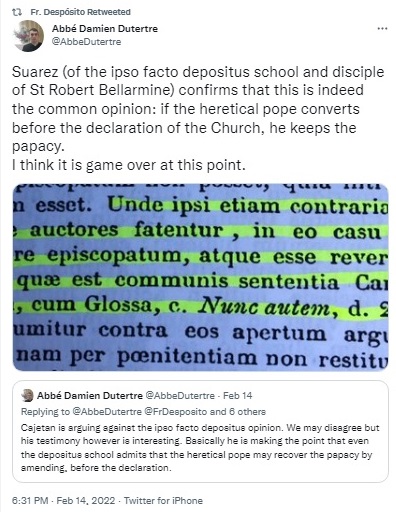
My comment:
The keyword here is the “Pope”, not a “material pope”.
St. Francis de Sales teaches as follows:
"Thus we do not say that the Pope cannot err in his private opinions, as did John XXII; or be altogether a heretic as perhaps Honorius was. Now when he is explicitly a heretic, he falls ipso facto from his dignity and out of the Church, and the Church must either deprive him, or, as some say, declare him deprived, of his Apostolic See, and must say as S. Peter did: Let another take his bishopric."
(LIBRARY OF ST. FRANCIS DE SALES, WORKS OF THIS DOCTOR OF THE CHURCH TRANSLATED INTO ENGLISH BY THE Very Rev. H. B. Canon MACKEY, O.S.B. UNDER THE DIRECTION OF THE Right Rev. JOHN CUTHBERT HEDLEY, O.S.B. Bishop of Newport, III. - THE CATHOLIC CONTROVERSY, Edited from the Autograph MSS. at Rome and at Annecy, THIRD EDITION, REVISED AND AUGMENTED, LONDON: BURNS & OATES, Limited, NEW YORK, CINCINNATI, CHICAGO: BENZIGER BROTHERS, 1909, pp. 305-306)
It looks like Fr. Desposito and Fr. Dutertre really recognize the Novus Ordo "material popes" as Popes.
But please, let's not mix terms, because we are not speaking about Popes.
We are speaking about men who were implicitly and explicitly heretics at the time of their elections, and for this reason their elections were null, legally invalid, and void. Even Bishop Donald Sanborn (the chief preacher of the “Thesis”) admits this: Vatican II, the Pope and SSPX: Q & A (Q&A 20)
Speaking of "John XXIII" and "Paul VI", and perhaps “John Paul I”, they carefully disguised themselves, and their heresy became evident, not immediately, but slowly, in a gradual way.
“John Paul II”, “Benedict XVI” and “Francis” were explicitly heretics at the time of their elections.
Third tweet:
@FrDesposito
10/21
BUT, Catholics who innocently and in good faith fall into heresy, DO NOT CEASE to be members of the Church, since no sin and no crime has being committed. Very important. See MacKenzie below (The Delict of Heresy, p.33).
11:11 PM - Feb 10, 2022
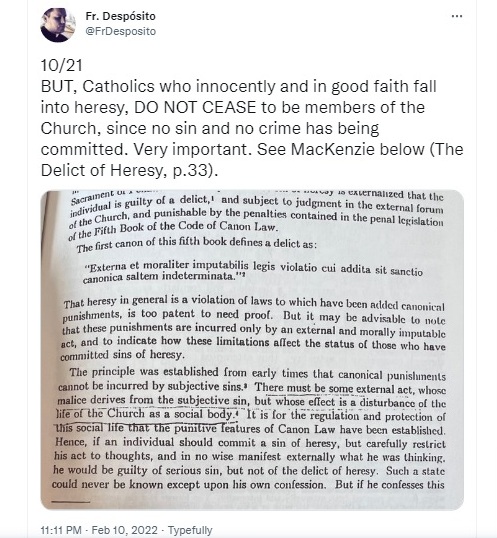
My comment:
If Father Desposito speaks about ordinary laymen who are ignorant of many nuances of Catholic doctrine, then they can be excused.
But if he means the heretical "material popes", then they cannot be excused. All of them were taught the Catholic Faith since their very childhood, studied at Catholic schools and seminaries, and some of them even were professors. There are no circumstances which excuse them from all responsibility. Therefore, to say about each of them “no sin and no crime has being committed”, sounds rather as a mockery.
Among other things Father Mackenzie (to whom Fr. Desposito refers) says about "some external act, whose malice derives from the subjective sin, but whose effect is a disturbance of the life of the Church as a social body". Doesn't this apply to the Vatican II "material popes"?
Also, Father Mackenzie made this very important note: "Moral theologians distinguish between the sin of external denial of the faith (which presupposes that the sinner continues to believe interiorly), and the sin of heresy in which faith is rejected both externally and internally"…"But the canonist properly presumes a sin of heresy as the cause of external words and acts contrary to faith, until the presumption is shown to be wrong by contrary facts."
According to Canon 2200, §2, if the fact of the violation of a law is certain, the intention or dolus is presumed until the contrary is proved.
Canon 2200, §2. Posita externa legis violatione, dolus in foro externo praesumitur, donec contrarium probetur.
The proof of ignorance rests on the perpetrator.
Here are some excerpts from THE REVEREND ERIC F. MACKENZIE’s Dissertation:
"That heresy in general is a violation of laws to which have been added canonical punishments, is too patent to need proof. But it may be advisable to note that these punishments are incurred only by an external and morally imputable act, and to indicate how these limitations affect the status of those who have committed sins of heresy.
The principle was established from early times that canonical punishments cannot be incurred by subjective sins.3 There must be some external act, whose malice derives from the subjective sin, but whose effect is a disturbance of the life of the Church as a social body,4 It is for the regulation and protection of this social life that the punitive features of Canon Law have been established. Hence, if an individual should commit a sin of heresy, but carefully restrict his act to thoughts, and in no wise manifest externally what he was thinking, he would be guilty of serious sin, but not of the delict of heresy. Such a state could never be known except upon his own confession. But if he confesses this sin with the sole purpose of obtaining forgiveness, this forgiveness will be accorded according to the principles guiding the administration of the Sacrament of Penance, and without any application of the penal laws which are now to be studied.5
The second essential characteristic of a delict is that it be morally imputable. The external act must be (or at least must seem to be), the expression of a mind that is aware of, and a will that is freely committed to, a sinful act. The preservation of order, and the elimination of quibbling excuses, make necessary the provision that where the external delinquent act has been committed, the existence of sin be presumed.6 In exceptional cases this juridical presumption of sin might lead to the imposition of penalties upon a person who in conscience was free from sin; however, such cases are rare, and in spite of them, the presumption is reasonable and necessary.
We therefore deal hereafter with heresy as an externalized, morally imputable violation of the Church’s law. And our first question concerns the mode of committing this delict. The first and obvious answer to this question is that the delict of heresy is committed most commonly by words, written or spoken. This is the ordinary way of externalizing thought. A person who ponders a question of faith and arrives at a decision, will regularly express his decision in speech or writing; and if the decision be a pertinacious assent to error, he is guilty of the sin of heresy as soon as he makes a definite act of perverse will, and of the delict of heresy as soon as he completely expresses his erroneous judgment. pp. 33, 34
Words are the ordinary, but not the only means of communication. Complete externalization of thought may exist in signs, acts or omissions. Hence Pighi rightly states that if a person disbelieves in the Real Presence, and, in token of this disbelief, deliberately omits to remove his hat in a Catholic Church, he has completely expressed his heretical tenet, and has incurred censure.8 p. 35
The very commission of any act which signifies heresy, e.g., the statement of some doctrine contrary or contradictory to a revealed and defined dogma, gives sufficient ground for juridical presumption of heretical depravity.12 There may however be circumstances which excuse the person either from all responsibility, or else from grave responsibility. These excusing circumstances have to be proved in the external forum, and the burden of proof is on the person whose action has given rise to the imputation of heresy. In the absence of such proof, all such excuses are presumed not to exist. p. 35
3 "Cogitationis poenam nemo patitur", - c. 14, D. I, de poenitentia
4 Wernz, l.c., VI, n. 3; n. 153; Noldin, De Censuris, n. 19
5 Blat, Coimnentarium, III, pars IV, p. 242. Vermeersch-Creuzen, Epitome, II, n. 660 inserts the word "externe" in the definition of a heretic.
6 Canon 2242, §1. This presumption may be disproved by demonstrating the existence of some one or more of the excuses recognized in canons 2201-2206.
Note also that moral theologians distinguish between the sin of external denial of the faith (which presupposes that the sinner continues to believe interiorly), and the sin of heresy, in which faith is rejected both externally and internally. The former is a sin against the commandment to profess the faith; the later is a sin against the commandment to assent interiorly. But the canonist properly presumes a sin of heresy as the cause of external words and acts contrary to faith, until the presumption is shown to be wrong by contrary facts. Hence the same canonical punishments have always been imposed upon both types of sinners.
8 Censurae Lalae Sententiae, n. 52, 2.
12 Canon 2200, §2.
(THE CATHOLIC UNIVERSITY OF AMERICA, Canon Law Studies, Number 77, THE DELICT OF HERESY IN ITS COMMISSION, PENALIZATION, ABSOLUTION, A DISSERTATION Submitted to the Faculty of Canon Law of the Catholic University of America in partial fulfillment of the requirements for the Degree of DOCTOR OF CANON LAW, BY THE REVEREND ERIC F. MACKENZIE, A.M., S.T.L., J.C.L. of the Archdiocese of Boston, The Catholic University of America, Washinqton, D. C. MCMXXXII, Nihil Obstat: PATRICK J. WATERS, Ph.D. Censor Deputalus, Imprimatur: WILLIAM CARDINAL O'CONNELL, Archbishop of Boston, Boston, June 1932, pp. 33, 34, 35)
Therefore, Fr. Desposito’s statement “Catholics who innocently and in good faith fall into heresy, DO NOT CEASE to be members of the Church, since no sin and no crime has being committed”, in no way can be applied to the Vatican II “material popes”; they are guilty of both the sin of heresy and the crime (delict) of heresy.
Also, I recommend reading two articles by Father Cekada, where he explains the distinction between the canonical crime of heresy, and the sin of heresy, which deprives a culprit from Church membership.
Sedevacantism and Mr. Ferrara’s Cardboard Pope
Resisting the Pope, Sedevacantism and Frankenchurch
Fr. V
|




